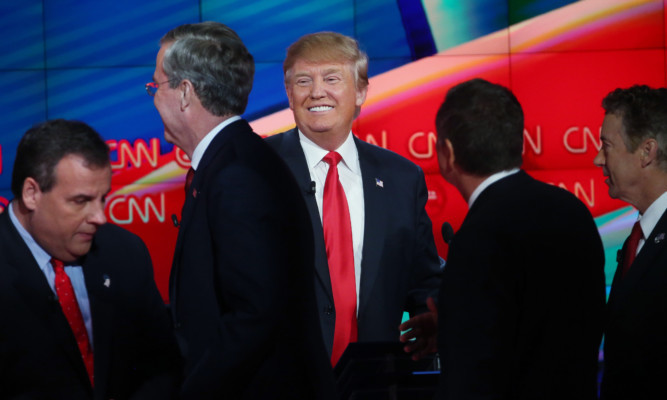Republican front-runner Donald Trump has stood firm over his provocative call for banning Muslims from the United States as his party’s presidential candidates pushed their own plans for fighting Islamic State (IS) militants.
A Las Vegas debate on Tuesday night was dominated by national security, reflecting the reshaping of the 2016 presidential contest by the recent attacks in Paris and San Bernardino, California.
Hours before the debate began, officials in Los Angeles closed all schools after an emailed threat that was later deemed a hoax.
Mr Trump insisted his proposal, roundly condemned by his rivals, was not an attempt to discriminate against Muslims.
“We are not talking about isolation, we’re talking about security,” he said. “We are not talking about religion, we are talking about security.”
The billionaire is facing a new challenge from Texas senator Ted Cruz, who has been rising in polls, particularly in Iowa, which holds its lead-off caucuses on February 1.
Former Florida governor Jeb Bush dismissed Mr Trump’s proposal, saying: “Donald is great at the one-liners, but he’s a chaos candidate and he’d be a chaos president.”
But Mr Cruz and Florida senator Marco Rubio said they understood why Mr Trump had raised the idea and avoided criticising the front-runner directly.
Mr Cruz said a more narrowly-focused approach would more effectively target Islamic militants. “It’s not a war on a faith,” he said.
Mr Rubio said of Mr Trump’s proposal, “It isn’t going to happen.”
Instead, the two senators debated at length their differences over government surveillance programmes.
Mr Rubio has accused Mr Cruz of weakening the government’s ability to track terrorists because he voted in favour of legislation to eliminate the National Security Agency’s bulk phone-records collection programme and replace it with a more restrictive effort to keep the records in phone companies’ hands.
Mr Cruz insisted the new law gives the government more access to mobile phones and other technology that terrorists are more likely to use – a contention Mr Rubio disputed.
“There is nothing we are allowed to do under this bill that we were not allowed to do before,” he said.
Beginning after the September 11, 2001, terror attacks, the NSA secretly collected the daily calling records – but not contents of conversations – for most Americans, including people never suspected of any crime.
A new law, called the USA Freedom Act, was passed in June with broad, bi-partisan support. It ordered the NSA to end bulk collection after a six-month transition that expired last week.
Mr Cruz and Mr Rubio have been sparring from afar over national security for weeks. The Texas senator is on the rise, particularly in Iowa’s lead-off caucuses, where he is challenging Mr Trump’s months-long lead.
